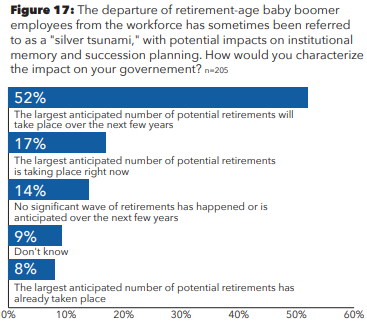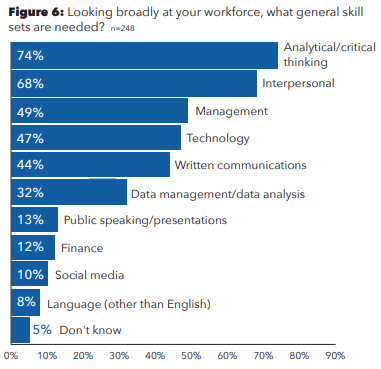CEOs are turning to HR leaders to recruit the talent needed to drive digital ambitions, but recruiting talent is a highly competitive market. The skill needs are very different now than pre-pandemic. These requirements continue to advance rapidly and create additional challenges with an increased retired workforce (mostly baby boomers).
Let’s take a deeper look at each and how robotics process automation (RPA) and a hybrid workforce approach can help.
Retiring Workforce Stats
Government employees tend to be an older age demographic (or should we say ‘seasoned’) compared to private industries.
- 3/4 government workers are ages 35+ compared with 3/5 private-sector workers.
- 40% of baby boomers already retired
- In 2009, 44% of retirement-eligible government employees postponed retirement due to the recession.
- Now influenced by the past year’s events, 38% indicated that employees accelerated their retirement plans – also known as Silver Tsunami.

The United States has more jobs than there are people to fill them and no way to increase the supply of human labor. That’s where the opportunity for automation lies.
54% of employees believe they could save up to two hours a day by automating tasks, equating to roughly 20 hours a month. By augmenting humans with software robots, companies fill the gaps in the labor force caused by aging populations and enable younger workers to take over higher-value work. Automation promises to relieve the stress workers experience from bigger workloads due to the human labor shortage and drive enterprise-wide benefits in the process.
Talent Skills Gap
Not too long ago, researchers asserted that technology would destroy 50% of all jobs in the U.S. Instead, there’s been an overflow of jobs and a lack of modern talent to fill them. The World Economic Forum estimates that more than 1 billion people will need reskilling by 2030 to succeed in the future of work.

Who has the time with the labor shortage discussed above? Robotic Process Automation (RPA) can save training time and gain experience in these critical soft skills.
Learn more about how MCCi and RPA can support your organizational goals.
Sources:
U.S. Bureau of Labor Statistics, EMPLOYEE TENURE IN 2020
WorkMarket, 2020 In(Sight) Report: What AI & Automation Really Mean For Work


